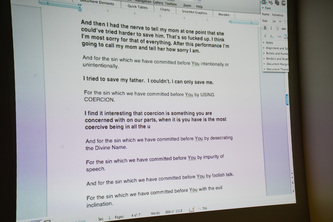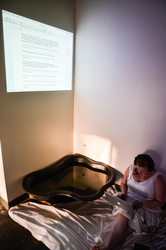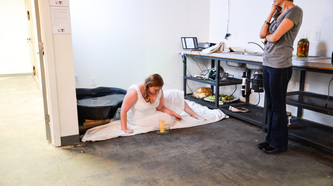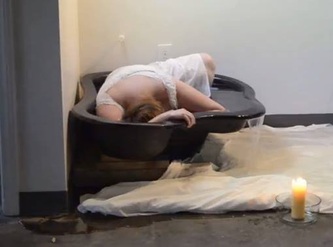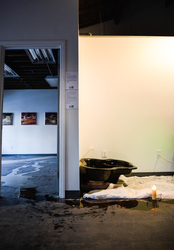Atonement
"Atonement", 2013
Performance, approximately 25 hours
dimensions vary
Yom Kippur, the holiest day in the Jewish calendar, begins at sundown September 13th and ends and sundown September 14th. Traditionally, it is believed that God writes one’s fate for the year in the Book of Life and on Yum Kippur, that book is closed with God’s final verdict. Thus Jews spend the day confessing and atoning for their sins, in addition to refraining from eating, drinking, bathing, wearing leather, engaging in sexual relations, and anointing one’s self with fragrance or lotion. It is believed that by denying the body comfort, one denies the soul comfort and is truly able to understand pain and reflect on the pain caused to others.
After participating in the abstention rituals of Yum Kippur, I confessed my sins for the year and begged forgiveness for them from the universe. At sundown, I purified myself in a homemade Mikveh (a body of “collected water” used in ritual purification) and broke my fast by serving apples, honey, and Challah bread to my guests and then having some myself.
Atonement explores the role of personal rituals, such as confession, acceptance, grieving, and sacrifice in the process of personal liberation and inner revolution. I am interested in the developing and evolving role of the radical and revolutionary in Western late Capitalism as a holistic identity.
Performance, approximately 25 hours
dimensions vary
Yom Kippur, the holiest day in the Jewish calendar, begins at sundown September 13th and ends and sundown September 14th. Traditionally, it is believed that God writes one’s fate for the year in the Book of Life and on Yum Kippur, that book is closed with God’s final verdict. Thus Jews spend the day confessing and atoning for their sins, in addition to refraining from eating, drinking, bathing, wearing leather, engaging in sexual relations, and anointing one’s self with fragrance or lotion. It is believed that by denying the body comfort, one denies the soul comfort and is truly able to understand pain and reflect on the pain caused to others.
After participating in the abstention rituals of Yum Kippur, I confessed my sins for the year and begged forgiveness for them from the universe. At sundown, I purified myself in a homemade Mikveh (a body of “collected water” used in ritual purification) and broke my fast by serving apples, honey, and Challah bread to my guests and then having some myself.
Atonement explores the role of personal rituals, such as confession, acceptance, grieving, and sacrifice in the process of personal liberation and inner revolution. I am interested in the developing and evolving role of the radical and revolutionary in Western late Capitalism as a holistic identity.
